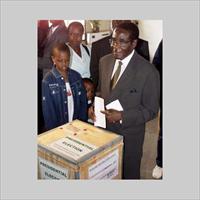ZIMBABWE: Post election violence increasing

"The situation is turning increasingly violent and
this worries us, as well as the electorate," Rangu Nyamurungira, projects
manager for Zimbabwe Lawyers for Human Rights (ZLHR), told IRIN.
Zimbabwe held combined presidential and parliamentary elections on 29
March, which saw opposition party's win control of parliament from ZANU-PF for
the first time since the country won its independence from Britain in
1980.
The opposition party, the Movement for Democratic
Change, has claimed its leader, Morgan Tsvangirai won the presidential vote by
the required 50 percent plus one vote, that if accurate, would negate the need
for a run-off presidential ballot. However, the Zimbabwe Electoral Commission
(ZEC), whose executive is appointed by Mugabe, has yet to release the results.
ZANU-PF, which has ruled Zimbabwe since independence, has
said there was no clear presidential winner and wants a recount in at least 21
constituencies where it says the party was prejudiced by ‘fraudulent’ counting.
Seven ZEC officials have reportedly been arrested.
The recently amended Electoral Act does not provide a
deadline for when election results should be announced, but the MDc has
resorted to the courts to try and force the ZEC to release the results of the
presidential ballot. The presiding judge has postponed judgment until 14 April.
"There is pervading fear that the delay in
announcing the presidential results could be because the votes are being
tampered with and we don’t believe ZEC when it says it is still verifying the
results. The electorate has the democratic right to be informed about the
results and the longer it takes, the greater the tension," Nyamurungira
said.
Fear of a violent run-off
David Chimhini, the director of the Zimbabwe Civic
Education Trust (ZIMCET), said there was "an ominous potential of the
political situation getting out of hand" should a run-off ballot be held,
which is likely to pit Mugabe against Tsvangirai.
Chimhini, who won the Mutasa North parliamentary seat
for the MDC in rural Manicaland province, said ZANU-PF youth militia and war
veterans were gathering in his constituency.
"The militia... are re-assembling and holding
frequent meetings with war veterans. This is getting people in my area really
scared, they are well known for violence," he said. "They refer to a
re-run as the beginning of another war."
Nyamurungira said human rights lawyers were receiving
reports from across the country of MDC supporters being "tortured by
loyalists of ZANU-PF and state agents who want to maintain the political status
quo."
Chimhini said despite a heavy police presence in both
rural and urban areas, authorities might be overwhelmed should tensions reach
boiling point.
"It seems he [Mugabe] can’t come to terms with the
fact that he can be defeated, and that is extremely dangerous. We might be
going back to the [year] 2000 scenario where... he unleashed soldiers on the
people and invaded farms, leading to hundreds of deaths," Chimhini said.
Intimidating the opposition
Takura Muzhingi, an MDC activist in former ZANU-PF
stronghold Mhondoro district in Mashonaland West province, told IRIN he fled
after a soldier accompanied by youths loyal to Mugabe visited him at his
parents home. "They told me that my days were numbered since I had openly
campaigned for Tsvangirai."
"They said they had a full list of all the people
in Mhondoro who were known MDC supporters and come campaign time for the re-run
of the presidential election, they would make mince meat of us," he said.
According to Muzhingi the soldier had paid regular
visits to the local headman "telling villagers that when the re-run takes
place, each village head will have to lead his people to the polling station
and remind them who to vote for."
Muzhingi has sought refuge with his brother’s family in
Chitungwiza, a small town 30km south of the capital Harare, and was arrested by riot police for
being on the streets after midnight.
"Even though they did not beat us up, I still live
with the fear and won’t venture out after dusk anymore. I hope that the
situation will not degenerate into total chaos that would give the government
the excuse to declare a state of emergency," Muzhingi said.
The government has not officially declared a curfew.
Targeting farms
In 2000, after Mugabe lost a referendum on a new
constitution - the first time ZANU-PF had lost any vote - veterans of Zimbabwe’s
liberation war led the often violent farm evictions following the government's
controversial land redistribution programme. Around 4,000 commercial white
farmers were forcibly removed to make way for landless blacks.
At an 8 April press briefing, Tendai Biti, the MDC
secretary general, called on the 14-member state regional body, the Southern
Africa Development Community (SADC),
to act so as to avoid "dead bodies on the streets of Harare [the capital]".
South African President Thabo Mbeki was appointed
mediator last year by SADC in talks between ZANU-PF and MDC to agree the
conditions for free and fair polls in Zimbabwe.
"There's been massive violence inside our country
since March 29 2008...MDC people are being beaten up ... farms with remaining
pockets of white people are being invaded. Farms with known MDC supporters are
being invaded.
"Militias are being re-armed, ZANU-PF supporters
are being rearmed. There has been a complete militarisation of Zimbabwean
society since March 29 2008," Biti said.
 Back and Next - Back and Next
Back and Next - Back and Next See Also - See Also
See Also - See Also